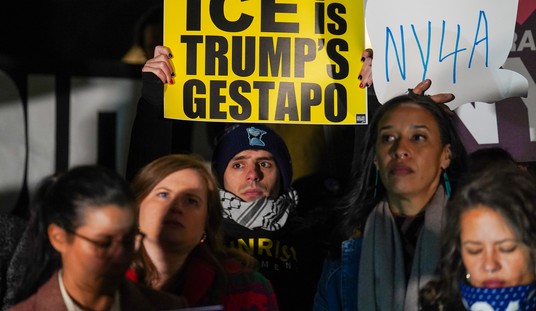When Mike Pence said that the US would not stand by while Nicolas Maduro turned Venezuela into a catastrophe, he and Donald Trump meant it. Until now, the US has taken care to target individuals within Venezuela’s evolving dictatorship. Today, Trump issued a new set of sanctions on the government as well as its state-owned oil company PDVSA, and warned that more may be coming if Maduro doesn’t change course:
Trump signs executive order imposing new Venezuela sanctions from CNBC.
The U.S. imposed its first economic penalties against Venezuela on Friday, hitting the South American country’s financial sector in an attempt to starve President Nicolás Maduro’s government of cash.
The Trump administration banned trades of Venezuelan debt, prohibiting Maduro’s government and its state-run oil company, Petróleos de Venezuela SA, from selling new bonds to Americans or in U.S. financial institutions. President Donald Trump signed an executive order approving the sanctions Thursday.
It’s not like Mike Pence didn’t warn Nicolas Maduro this was coming, as he himself noted on Twitter. Pence also attached the executive order for the sanctions in full:
As I said in Latin America last week & Wed. to the Venezuelan community in Miami, @POTUS Trump & USA will not standby as Venezuela crumbles. pic.twitter.com/2kZtAz1ZDB
— Vice President Mike Pence Archived (@VP45) August 25, 2017
These new sanctions target Maduro’s ability to defray his growing debt problem, and will have an impact on the ability to sell oil too, once the sanctions go into effect after a 30-day “wind-down” period:
Barring Venezuelan debt purchases could cripple Caracas’ ability to raise money to pay off interest on its growing national debt, as the oil-producing country has been doing in the middle of an unprecedented economic collapse. The U.S. suspects PDVSA, the source of most of the government’s funding, has become a corrupt, money-laundering enterprise.
Most existing Venezuelan debt traded in the U.S. was issued by PDVSA. The sanctions don’t prohibit the resale of those bonds, only purchases and trades of new PDVSA debt.
But trades of existing bonds issued by the Venezuelan government — which are different from PDVSA bonds — will be barred, a move intended to harm and sow discontent among Maduro’s inner circle. Much of that debt is held by high-level Venezuelan government leaders, who will now be forced to turn to other so-called secondary markets (say, in China or Russia) to sell.
Maduro accused the US of imposing a “financial blockade” on Venezuela earlier this week. That came in apparent answer to Pence’s cryptic comment about “more to come”:
Maduro said earlier this week that Venezuela is prepared for any U.S. sanctions and that the Trump administration is trying to create a “financial blockade” against the South American nation. He called relations with the U.S. the worst in history. …
The measures to be announced on Friday would come days after Vice President Mike Pence met with Venezuelan exiles in Florida.
“The United States of America will continue to bring the full measure of American economic and diplomatic power to bear until democracy is restored in Venezuela,” Pence said in remarks on Aug. 23 at a Catholic church in Doral, Florida. He noted the sanctions already imposed recently and said “there’s more to come.”
USA Today reports that these sanctions are designed to cut off some loopholes in earlier sanctions by targeting the government and PDVSA directly. That, they hope, will force Maduro to either back down from its illegitimate efforts to create a rubber-stamp parliament or perhaps even foment some cracks among Maduro’s inner circle. So far that seems unlikely, if only because any disunity now would put all their backs up against the proverbial wall. Clearly, though, Trump and Pence have stopped worrying about subtlety and are going to get more and more assertive in South America.








Join the conversation as a VIP Member